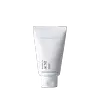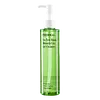What's inside
What's inside
 Key Ingredients
Key Ingredients

 Benefits
Benefits

 Concerns
Concerns

 Ingredients Side-by-side
Ingredients Side-by-side

Water
Skin ConditioningCocamidopropyl Betaine
CleansingSodium Methyl Oleoyl Taurate
CleansingPEG-75
HumectantAcrylates Copolymer
Glycerin
HumectantDisodium Cocoamphodipropionate
CleansingPEG-120 Methyl Glucose Dioleate
EmulsifyingDimethyl Sulfone
SolventPyridoxine Hcl
Skin ConditioningSalix Alba Bark Extract
AstringentForsythia Suspensa Fruit Extract
AntioxidantButylene Glycol
HumectantCentella Asiatica Extract
CleansingPolygonum Cuspidatum Root Extract
AntioxidantScutellaria Baicalensis Root Extract
AstringentCamellia Sinensis Leaf Extract
AntimicrobialGlycyrrhiza Uralensis Root Extract
Skin ConditioningChamomilla Recutita Flower Extract
MaskingRosmarinus Officinalis Leaf Extract
AntimicrobialSodium Chloride
MaskingCopper Tripeptide-1
Skin ConditioningAllantoin
Skin ConditioningCitric Acid
BufferingPotassium Hydroxide
BufferingSodium Benzoate
MaskingPhenoxyethanol
PreservativeDisodium EDTA
Water, Cocamidopropyl Betaine, Sodium Methyl Oleoyl Taurate, PEG-75, Acrylates Copolymer, Glycerin, Disodium Cocoamphodipropionate, PEG-120 Methyl Glucose Dioleate, Dimethyl Sulfone, Pyridoxine Hcl, Salix Alba Bark Extract, Forsythia Suspensa Fruit Extract, Butylene Glycol, Centella Asiatica Extract, Polygonum Cuspidatum Root Extract, Scutellaria Baicalensis Root Extract, Camellia Sinensis Leaf Extract, Glycyrrhiza Uralensis Root Extract, Chamomilla Recutita Flower Extract, Rosmarinus Officinalis Leaf Extract, Sodium Chloride, Copper Tripeptide-1, Allantoin, Citric Acid, Potassium Hydroxide, Sodium Benzoate, Phenoxyethanol, Disodium EDTA
Water
Skin ConditioningCoco-Betaine
CleansingGlycerin
HumectantButylene Glycol
HumectantMelaleuca Alternifolia Leaf Water
AntimicrobialAloe Barbadensis Leaf Water
Masking1,2-Hexanediol
Skin ConditioningSodium Chloride
MaskingCentella Asiatica Extract
CleansingCamellia Sinensis Leaf Extract
AntimicrobialGlycyrrhiza Glabra Root Extract
BleachingRosmarinus Officinalis Leaf Extract
AntimicrobialPotassium Cocoyl Glycinate
Melilotus Officinalis Extract
AstringentTromethamine
BufferingAsiaticoside
AntioxidantMadecassic Acid
Skin ConditioningAsiatic Acid
Skin ConditioningGluconolactone
Skin ConditioningXylitol
HumectantEthylhexylglycerin
Skin ConditioningSalix Alba Bark Extract
AstringentAnhydroxylitol
HumectantGlucose
HumectantMelia Azadirachta Flower Extract
Skin ConditioningChaenomeles Sinensis Fruit Extract
AntioxidantCitrus Aurantium Dulcis Flower Extract
Skin ConditioningAcrylates/C10-30 Alkyl Acrylate Crosspolymer
Emulsion StabilisingCutibacterium Granulosum Ferment Extract Filtrate
EmollientXylitylglucoside
HumectantPolyglyceryl-4 Caprate
EmulsifyingChamomilla Recutita Flower Extract
MaskingMelia Azadirachta Leaf Extract
Skin ConditioningPolygonum Cuspidatum Root Extract
AntioxidantScutellaria Baicalensis Root Extract
AstringentWater, Coco-Betaine, Glycerin, Butylene Glycol, Melaleuca Alternifolia Leaf Water, Aloe Barbadensis Leaf Water, 1,2-Hexanediol, Sodium Chloride, Centella Asiatica Extract, Camellia Sinensis Leaf Extract, Glycyrrhiza Glabra Root Extract, Rosmarinus Officinalis Leaf Extract, Potassium Cocoyl Glycinate, Melilotus Officinalis Extract, Tromethamine, Asiaticoside, Madecassic Acid, Asiatic Acid, Gluconolactone, Xylitol, Ethylhexylglycerin, Salix Alba Bark Extract, Anhydroxylitol, Glucose, Melia Azadirachta Flower Extract, Chaenomeles Sinensis Fruit Extract, Citrus Aurantium Dulcis Flower Extract, Acrylates/C10-30 Alkyl Acrylate Crosspolymer, Cutibacterium Granulosum Ferment Extract Filtrate, Xylitylglucoside, Polyglyceryl-4 Caprate, Chamomilla Recutita Flower Extract, Melia Azadirachta Leaf Extract, Polygonum Cuspidatum Root Extract, Scutellaria Baicalensis Root Extract
 Reviews
Reviews

Ingredients Explained
These ingredients are found in both products.
Ingredients higher up in an ingredient list are typically present in a larger amount.
Butylene Glycol (or BG) is used within cosmetic products for a few different reasons:
Overall, Butylene Glycol is a safe and well-rounded ingredient that works well with other ingredients.
Though this ingredient works well with most skin types, some people with sensitive skin may experience a reaction such as allergic rashes, closed comedones, or itchiness.
Learn more about Butylene GlycolCamellia Sinensis Leaf Extract is derived from the leaves of the tea plant. Black tea, green tea, and oolong tea are all harvested from this plant.
This ingredient has many skin benefits:
This ingredient contains polyphenols, a strong antioxidant. Antioxidants help fight off molecules that damage skin cells.
On top of that, the antioxidants in green tea neutralize free-radicals from the sun. This gives the skin some extra UV protection, but should not replace sunscreen.
Many components of tea have anti-inflammatory properties.
Polyphenols and L-theanine help soothe the skin and reduce irritation. The caffeine in Camellia Sinensis Leaf Extract helps calm inflamed blood vessels.
Other compounds found in tea include: Vitamin Bs, linoleic acid, magnesium, calcium, iron, and zinc.
Research has shown both drinking Camellia Sinensis Leaf Tea and applying it to the skin can help boost skin elasticity and hydration. Studies also show using tea extract may reduce sebum, or oil, production.
Learn more about Camellia Sinensis Leaf ExtractCentella Asiatica Extract (Centella) is derived from an herb native to Southeast Asia. It is famous for its anti-inflammatory and soothing properties.
Centella is rich in antioxidants and amino acids, such as Madecassic Acid and Asiaticoside.
Studies show the compounds in centella help with:
The combination of all these properties makes centella effective at soothing, hydrating, and protecting the skin.
Other great components of centella include Vitamin A, vitamin C, several B vitamins, and Asiatic Acid.
Fun fact: Centella has been used as a medicine and in food for many centuries. As a medicine, it is used to treat burns, scratches, and wounds.
Learn more about Centella Asiatica ExtractChamomilla Recutita Flower Extract comes from the Chamomile flower.
Chamomile is rich in antioxidants and has anti-inflammatory properties. Several compounds found in chamomile help with soothing, such as bisbolol.
Antioxidant components in chamomile make it an effective ingredient to help slow the signs of aging. Antioxidants help fight free-radical molecules, or molecules that may damage your skin.
Essential oils from chamomile have been found to improve wound healing due to its antimicrobial properties.
Ancient Greeks and Egyptians used Chamomile to treat skin redness and dryness. Chamomile has also been used to help treat stomach issues.
Learn more about Chamomilla Recutita Flower ExtractGlycerin is already naturally found in your skin. It helps moisturize and protect your skin.
A study from 2016 found glycerin to be more effective as a humectant than AHAs and hyaluronic acid.
As a humectant, it helps the skin stay hydrated by pulling moisture to your skin. The low molecular weight of glycerin allows it to pull moisture into the deeper layers of your skin.
Hydrated skin improves your skin barrier; Your skin barrier helps protect against irritants and bacteria.
Glycerin has also been found to have antimicrobial and antiviral properties. Due to these properties, glycerin is often used in wound and burn treatments.
In cosmetics, glycerin is usually derived from plants such as soybean or palm. However, it can also be sourced from animals, such as tallow or animal fat.
This ingredient is organic, colorless, odorless, and non-toxic.
Glycerin is the name for this ingredient in American English. British English uses Glycerol/Glycerine.
Learn more about GlycerinPolygonum Cuspidatum Root Extract comes from the Japanese Knotweed plant native to Japan, Korea, and China.
This plant contains anti-inflammatory and antioxidant properties. It contains high amounts of resveratrol, a potent antioxidant.
The root of the plant has been used in traditional folk medicine throughout Asia.
Learn more about Polygonum Cuspidatum Root ExtractRosmarinus Officinalis Leaf Extract comes from rosemary. Rosemary is native to the Mediterranean.
While Rosmarinus Officinalis Leaf Oil can be volatile due to its fragrant properties, the fragrance components are usually removed in the leaf extract.
Rosemary Leaf Extract contains many antioxidants such as rosmarinic acid and caffeic acid. Rosemarinic acid, a compound found in rosemary leaf, has been found to help soothe skin conditions such as eczema and acne.
Learn more about Rosmarinus Officinalis Leaf ExtractSalix Alba Bark Extract comes from the white willow tree, which is native to Europe and Central Asia.
Salix Alba Bark Extract has often been described as salicylic acid's cousin. This is due to the salicin it contains. However, studies are limited showing salix alba bark to be an effective salicylic acid alternative.
Salicin does have anti-inflammatory and antioxidant properties. It has shown to decrease the formation of inflammatory mediators, such as tumor necrosis factor-α and nuclear factor-kappa B. Salicin also has a mildly exfoliating effect on the skin.
Several other components in salix alba bark extract also contain antioxidant properties, such as flavonoids and polyphenols. Antioxidants may help with anti-aging as they neutralize harmful free-radical molecules.
Willow Bark extract has been used for thousands of years. Ancient civilizations used white willow to help treat pain and fevers.
Learn more about Salix Alba Bark ExtractScutellaria Baicalensis Root Extract comes from the Baikal skullcap or Chinese skullcap plant. This plant is native to Northeast Asia and can be found in China, Mongolia, Korea, and Siberia.
In cosmetics, Scutellaria Baicalensis Root Extract provides antioxidant and anti-inflammatory benefits. This is due to the flavonoid composition of Scutellaria Baicalensis Root Extract.
In Chinese traditional folk medicine, Scutellaria Baicalensis Root Extract is used to help treat lung issues and hypertension.
Learn more about Scutellaria Baicalensis Root ExtractChances are, you eat sodium chloride every day. Sodium Chloride is also known as table salt.
This ingredient has many purposes in skincare: thickener, emulsifier, and exfoliator.
You'll most likely find this ingredient in cleansers where it is used to create a gel-like texture. As an emulsifier, it also prevents ingredients from separating.
There is much debate on whether this ingredient is comedogenic. The short answer - comedogenic ratings don't tell the whole story. Learn more about comegodenic ratings here.
The concensus about this ingredient causing acne seems to be divided. Research is needed to understand if this ingredient does cause acne.
Scrubs may use salt as the primary exfoliating ingredient.
Learn more about Sodium ChlorideWater. It's the most common cosmetic ingredient of all. You'll usually see it at the top of ingredient lists, meaning that it makes up the largest part of the product.
So why is it so popular? Water most often acts as a solvent - this means that it helps dissolve other ingredients into the formulation.
You'll also recognize water as that liquid we all need to stay alive. If you see this, drink a glass of water. Stay hydrated!
Learn more about Water